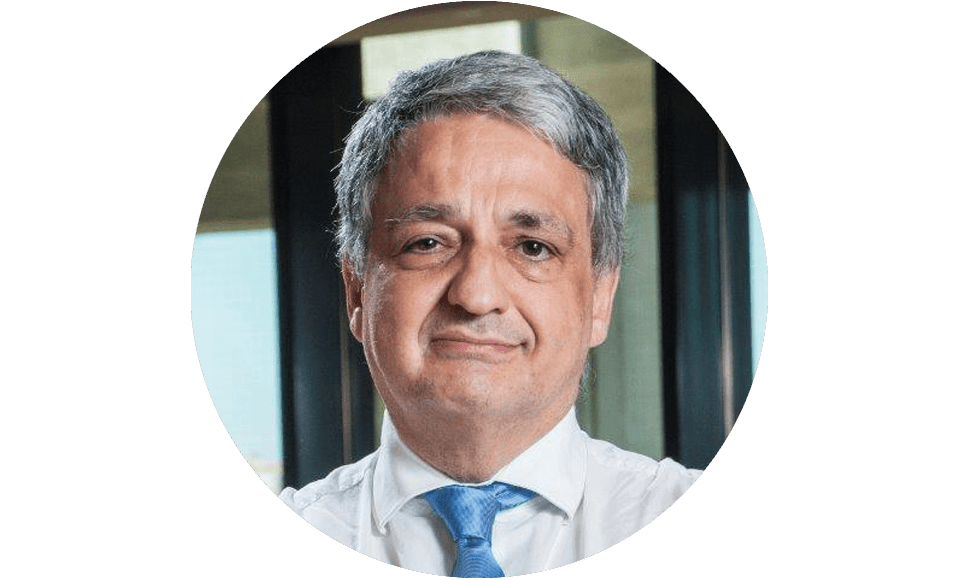Paulo Macedo, CEO Caixa Geral de Depósitos
According to the Greek mythology, Sisyphus was the founder of Corinth and its first king. After having defied and disobeyed the Gods he was condemned to roll an immense boulder up a hill for eternity. Every time he neared the top, the boulder would roll back down the hill and Sisyphus had to start all over again. Over and over. For eternity.
We did not disobey the gods but in some ways we are like Sisyphus, pushing the boulder up the hill and having to start over and over again. In our particular case, though, as economists and managers, this is not any kind of punishment. The permanent reconstruction of reality is part of our day-to-day work. And given that we cannot remain static in a world that is changing at an increasing speed, we must constantly reassess reality and rebuild paths.
Could we, a year and a half ago, predict what would happen next?
• The Portuguese and the world economy were affected by a pandemic that caused the biggest recession in this century.
• A drop in consumption and in the use of means of payment, with the resulting reduction of bank commissions.
• Increased savings in Portugal and in the rest of Europe, with a significant increase in deposits.
• Abundant liquidity.
• A reduction in interest rates, which have reached new historical lows, with 50 bp negative marginal deposit cost.
• A new increase in competition in the banking sector, relative to credit volumes, in order to maintain financial margins in the light of the drop in interest rates.
• Demand for credit, particularly Government-backed credit lines, and a slump in investment (except in the construction sector).
Within this context, the challenges for the banking sector as a result of the pandemic crisis are huge and have caused a direct increase in credit risk and still lower profits (the return on banking capital has been lower than the respective costs for more than a decade). Added to this are the issue of structural challenges (regulation, profitability, reinvention, reputation and reconstruction) and factors such as environmental criteria currently being increasingly factored in when it comes to the granting of credit, or the growing trend towards the digitisation of financial services and technological innovation.
In this context, we should restate the responses that we have provided:
1) Protect customers and employees in the face of the pandemic;
2) Adapt and ensure 100% responsiveness during lockdown, with substantial changes in the modus operandi;
3) Respond to the needs of households and companies in light of the need to deal with the crisis (guaranteed credit lines, moratoria, contactless means of payment, reinforcement of digital channels);
4) Reinforce internal supervision;
5) Create, acquire, develop and mobilise resources and skills, recruiting more talent and better rewarding merit;
6) Reduce the Bank’s risk by simplifying its structure and processes;
7) Modernise and digitise the business;
8) Continue to monitor customers who have credit moratoria and assess their needs so as to provide assistance when they come to an end.
In 2020, we secured once again the leading position in the Portuguese market in terms of number of customers and number of digital customers, with a significant increase in recognition as the best digital bank.
We have more than 2,250,000 active digital customers in the CGD Group. We managed, thanks to the efforts of a huge team, to establish the first 100% remote working contact centre of a bank in Portugal. We ensured an adequate response without interruption in the daily support to families and companies in a pandemic context and we were able to successfully respond to more than 33% growth in the number of interactions with customers in the contact centre.
We are the opposite of Sisyphus. Exogenous factors may force us to retrace our steps over and over but as regards endogenous data we want our landmarks to stay at the top of the hill so as to prevent our being faced with difficult situations.
Two questions must asked at this moment. How can we face the credit challenges and the end of moratoria? What will the bank’s capital requirements be in the future?
The pandemic will put to the test companies, first and foremost, but also the banking sector in Portugal and in other countries. The financial sector is now more resilient than in 2007. It has improved its capital ratios and reduced problematic credits over the past 10 years. We have witnessed a substantial reduction in the transformation ratio and reinforcement of capitalisation levels, while our capital ratio (Tier1) has increased markedly (twofold or threefold compared to the situation as at the beginning of the last crisis).
Credit risk and solvency risks will again require greater attention from banks in Portugal, with a focus on the ability to grant credit with adequate risk – so that, when the next crisis occurs, society will not ask why those credits were granted in the first place.
The default ratio (NPL) at Caixa moved from 15.8% to 3.9%, between 2016 and 2020.
Amid so many difficulties, we do not just roll our burden up the hill to the top. We rely on the reality of Caixa, which we are proud to have transformed, reaffirming its identity, which was paramount in helping us overcome the obstacles over the past year. Our leadership in the digital segment enabled us to work remotely while at the same time staying very close to our customers. Through our workforce we manage to continuously assist families, companies and the economy, by adopting a personalised management approach.
In other words, we confirmed that the future is just around the corner. We will move onwards, and upwards, like Sisyphus – with the firm intention of not letting the boulder roll back down the mountain. If we have anything to do with it, that will not happen.
Are we all Sisyphus? Yes, a little bit. But with focus, resolve and purpose.







